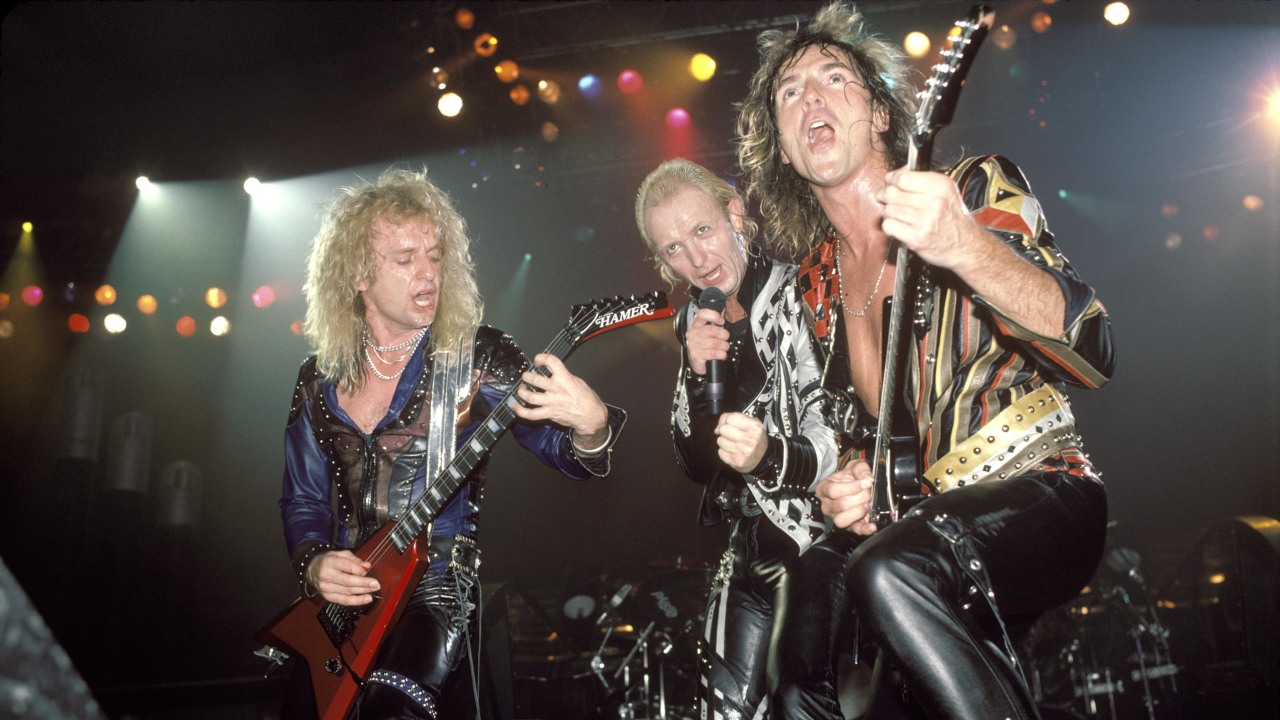Stability in life is something that Judas Priest surely envy. They conquered America during the 1980s, yet were so impoverished at the start of their career that their original singer, Alan Atkins, was forced to quit when his wife became pregnant.
They rivalled Spïnal Tap by having different drummers on all of their first four albums and shocked the world when singer Rob Halford quit in an outrageous war of words, replacing him with such an unknown that even Hollywood noticed. More than 30 million album sales along the way, Priest remain one of the biggest bands in the world, but even in recent times, they were still surrounded by more than their fair share of uncertainty.
Atkins co-founded Judas Priest in the Midlands during the early 70s, when they were managed briefly by Black Sabbath guitarist Tony Iommi. Despite admitting he’d only played guitar for a few weeks, KK Downing auditioned to join, and was rebuffed. However, Downing eventually achieved his goal. Although local vocalist Robert Halford remembers witnessing the Atkins-fronted band indulging in “lots of free-form jamming” when he saw them live, he felt they had enough personality to persuade him to audition when the singer spot became vacant.
“After Alan had to go and get a real job, Ken [KK] came over to my house to meet me, and I was already in my room singing,” chuckles Halford now. “He heard me doing all these harmonies and I think I actually got the job before he even saw me. After that, we just played the length and breadth of Britain. If there was a bar or a club, we played it.”
KK: “The four-piece of him, [bassist] Ian Hill, [drummer] John Hinch and myself slogged around for years and eventually secured a recording contract with a small company called Gull Records. It was a scrappy deal, but it was a start.”
Gull suggested expanding the line-up to a five-piece. Enter: Glenn Tipton. Having just left the Flying Hat Band, the guitarist had also attended Priest shows and admits that although there had been rivalry, it took “about a millisecond to realise the potential” of what he was joining.
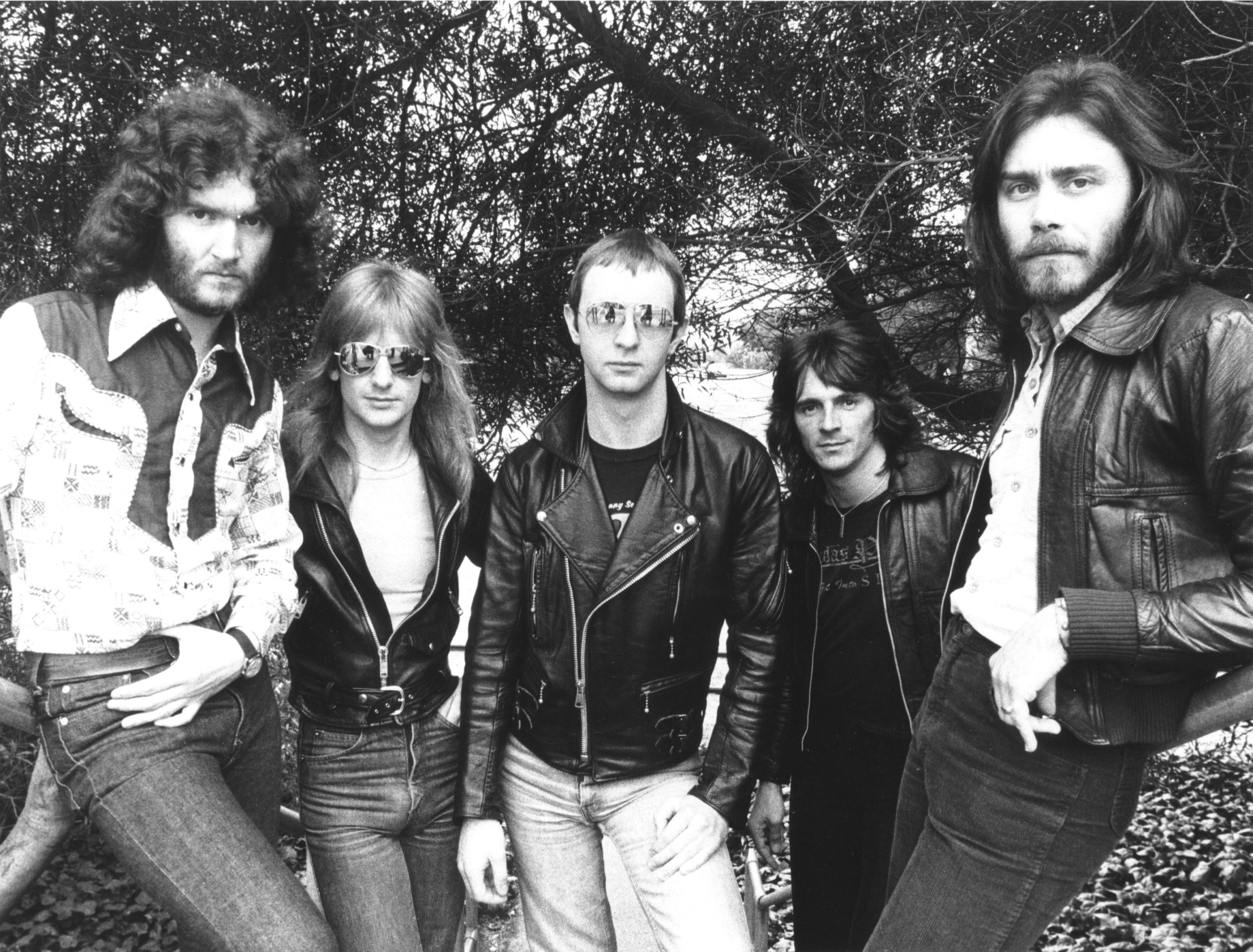
“The early music was actually quite progressive,” adds Tipton. “Although it was poorly produced, the first album, Rocka Rolla, was heavy and had a lot of light and shade. Right from the start it sounded like Judas Priest.”
Produced by Rodger Bain, who’d also handled the first three Black Sabbath albums, 1974’s Rocka Rolla generated what KK calls “an underground swell”, but the following year’s Sad Wings Of Destiny gave them a genuine toehold. Some of its contents have remained in Judas Priest’s repertoire to this day, including Victim Of Changes, Ripper, Tyrant and Genocide. Yet for all the new-found attention that the band were attracting, the band themselves remained destitute.
“Gull were taking the piss at the time of the Sad Wings… album,” says Downing. “It charted in several countries, including the US, but when we asked them for £25 each a week, they turned us down. The work was starting to flood in, but we needed to pay petrol money and road crew, maybe hire a bigger PA. So we had no choice but to tell them to fuck off, they could sue us if they wanted to. When we got picked up by CBS, the big wheels really started to roll. Gull had been advancing us £2,000 per record, but we went to £60,000 with CBS almost overnight.”
Priest would remain with CBS/Sony until the end of the 90s. Yet despite the liaison benefitting both parties immensely, the label didn’t always understand their new signings. One legendary music business story suggests that at a product meeting, an employee who really should have known better asked, “And what time will Mr Priest be arriving?”
Rob Halford neither confirms nor denies the story, though he does say: “Unfortunately, there were isolated incidents that would really flabbergast you, but the long-term relationship was good. I just don’t think they knew how to deal with these five guys from the Midlands.”
“Initially, Sony were brilliant,” recalls Tipton. “They believed in us and enabled us to start putting on a decent show. And we could afford to eat hearty meals. Although Sin After Sin was a good album that featured Dissident Aggressor and Starbreaker, it wasn’t abounding with songs. And because Roger Glover [the Deep Purple bassist who produced it] came in halfway through, it sounded a bit thin.”
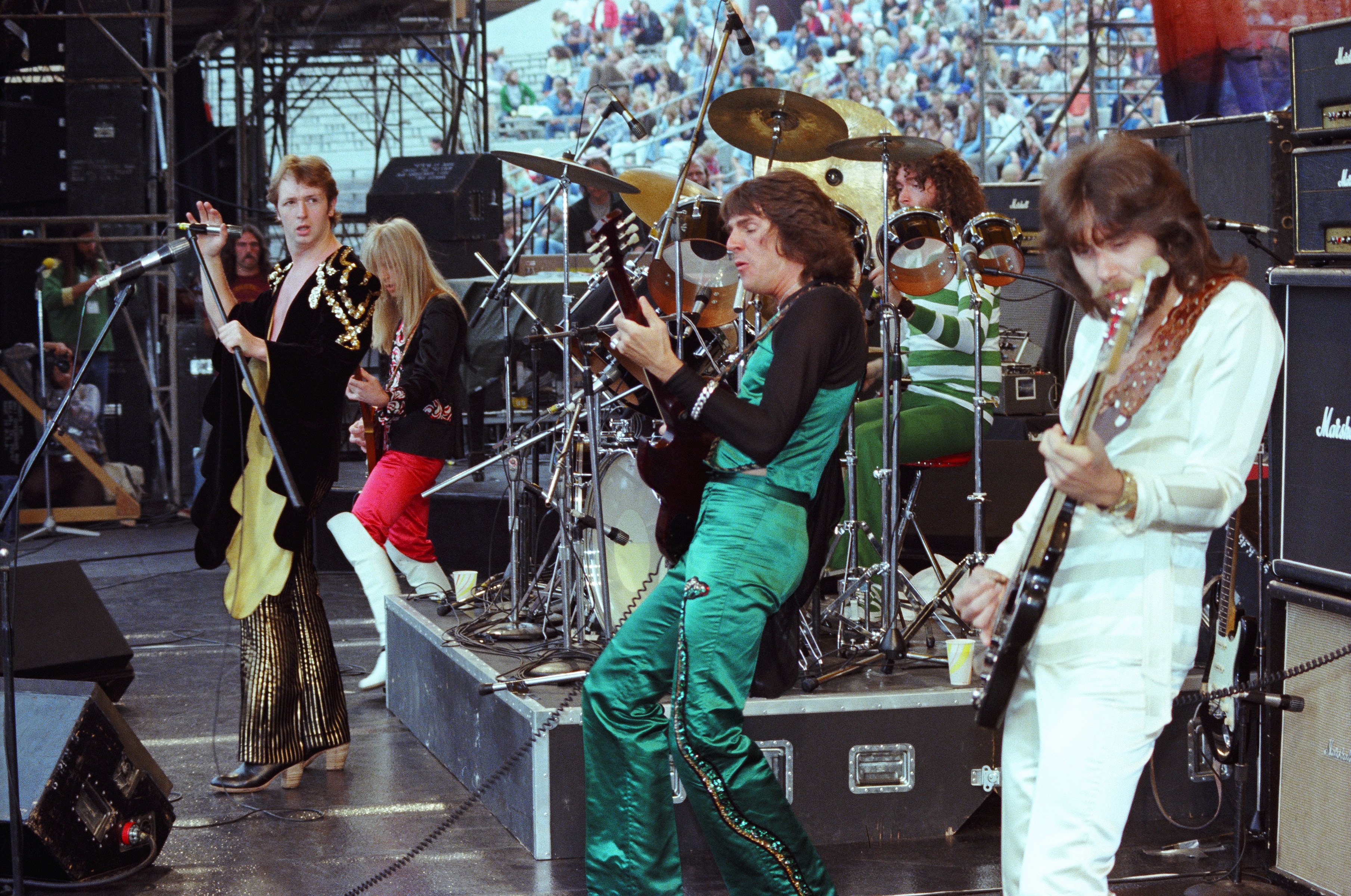
But the band’s popularity continued to grow. Promoting Sin… in 1977, Priest headed to America for the first time.
“We were more than ready to come back home, but then we were offered the chance of supporting Led Zeppelin in San Francisco at the Day On The Green Festival,” remembers Tipton. “65,000 people. It really helped to break us on the west coast, and it was the beginning of Priest conquering the whole of America.”
The following year saw the release of both the Stained Class and Killing Machine albums (the latter called Hell Bent For Leather in the States where it was felt the original title might corrupt minors).
One of the more controversial tracks on Killing Machine was Take On The World, a rhythmic anthem that provided them with a shock hit single.
“I always felt that Take On The World was a bit contrived,” admits Glenn, “but it was extremely successful, so what do I know?”
“It sold something like 400,000 copies as a single, which is probably more than whatever topped the charts last week,” says KK. “Getting onto Top Of The Pops sure as fuck surprised us, we just thought we were doing the same thing as Queen did with We Will Rock You, and the sentiments of the song were intended as sincere.”
In interviews, Halford seemed exceptionally moved by Queen in general, and Freddie Mercury in particular, so it was no surprise the band pushed the envelope the way they did.
“Were we trying to break out of the metal mould?” muses Tipton. “Not really, but throughout our career we’ve observed successful professional bands, and although we would never, ever try to copy them, we’ve gained inspiration. We’ve just recreated that inspiration in our own unique way.”
Although 1979’s live album, Unleashed In The East, was originally intended solely for the Japanese market, it provided a much larger breakthrough. A landmark release not just for Priest but for metal as a genre, the band were accused of over-dubbing it to the point where it became known as Unleashed In The Studio. It even transpires that the sleeve wasn’t shot at Tokyo’s Koseinenkin Hall or the Nakano Sunplaza, but mocked up in the cosy confines of Dunstable Civic Hall instead.
No, no, no… if anybody tries to tell you it wasn’t a live album they’re lying,” sighs Tipton, with impatience. “There was some patching up, but no more or less than any other band.”
In 1980, Priest moved to Tittenhurst Park, John Lennon’s former home, to create what is still regarded as their most enduring album, British Steel. One night, while Tipton assumed the rest of the band were sleeping, he began cranking out a spectacular riff. Unbeknown to Glenn, the noise was keeping Halford awake upstairs and the singer found himself humming a hook to accompany the guitar motif. The next day they pooled ideas and wrote Living After Midnight, destined to become their biggest hit single. Besides working for the first time with legendary producer Tom Allom, it was also the first time Tipton, Downing and Halford had composed as a trio; a combo that would reap unexpected dividends.
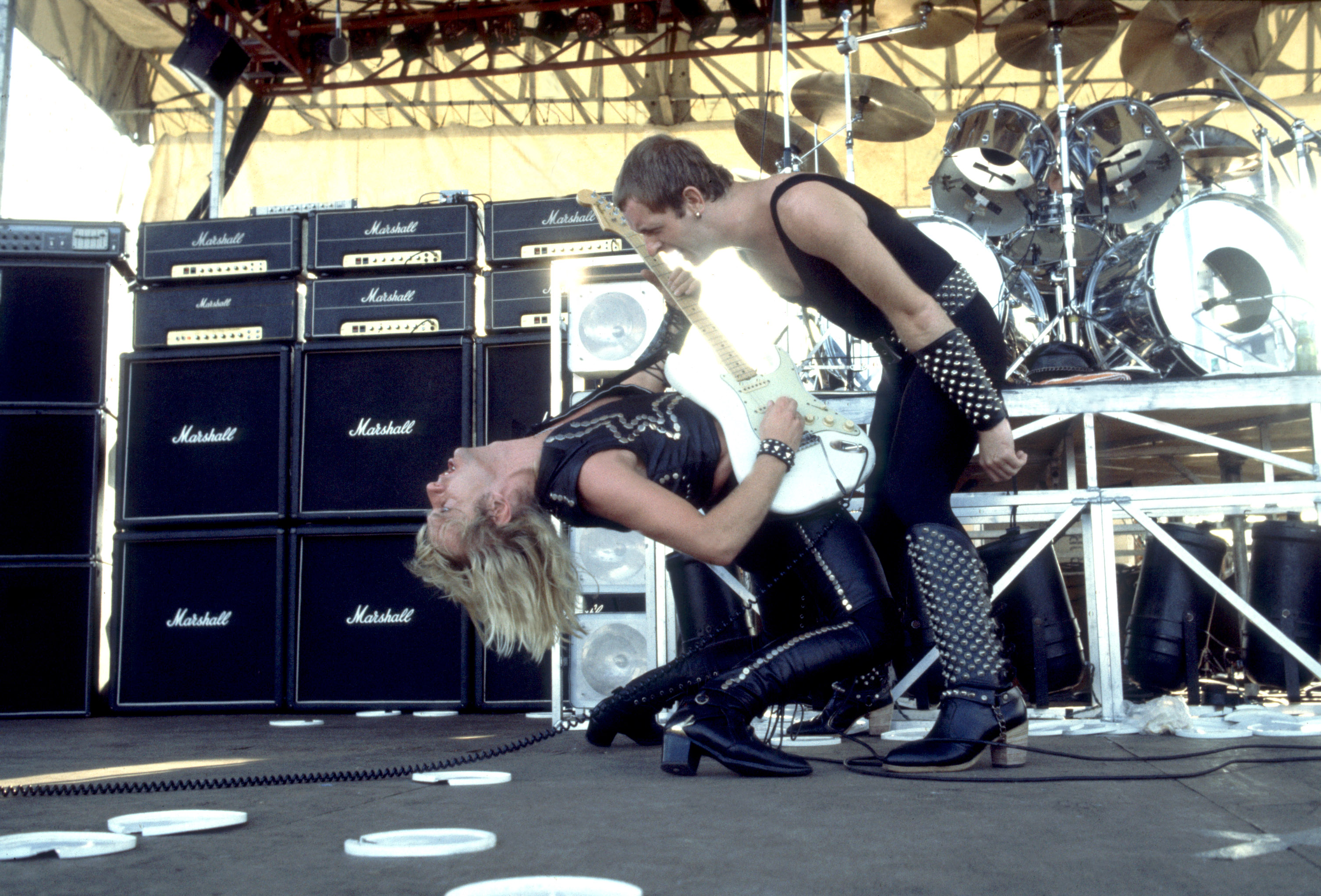
“The track listing reads like the bible of heavy metal, doesn’t it?” Tipton purrs proudly. “Everything about it was right, from the cover onwards.”
Yet from the perspective of their British audience, Priest scored a damaging own goal when they appeared on Top Of The Pops with the United single. For the second year running the offer of a TV slot happened to coincide with a concert in Birmingham, their home city. They were not best pleased then when, despite assurances that the band would arrive at the gig on time, their private plane was stranded fog-bound at Luton Airport.
“Doing that in Birmingham was the worst decision we ever made,” frowns Tipton now. “We were talked into it, and of course it went horribly wrong. When we finally arrived at the venue some people had left, and I didn’t blame them. I think [that incident] was responsible for a certain amount of the resentment that built up when we spent so much time in America years later.”
Despite their success the band needed to make an impact in the States if they were to survive.
“We wanted to become a world-renowned band. I can’t blame people if that pissed them off, but it was something we had to do,” stresses Glenn. “If we hadn’t gone to America we would probably only have lasted for another three or four years.”
It’s generally acknowledged that the band dropped the ball slightly with 1981’s US-orientated Point Of Entry album, and Halford admits to being “dismayed” by the reaction it received. Yet KK insists the problems weren’t all of the band’s own making.
“People don’t understand how pressurised we were by the label, either to do covers or make hits,” he says. “With that album, we gave them what they wanted.”
Point Of Entry sold half a million copies in three months, and the band’s entire focus changed. “Some of the shows we put on during those years must have been second only to Kiss,” Downing enthuses. “We may never see anything like those gigantic moving robots again.”
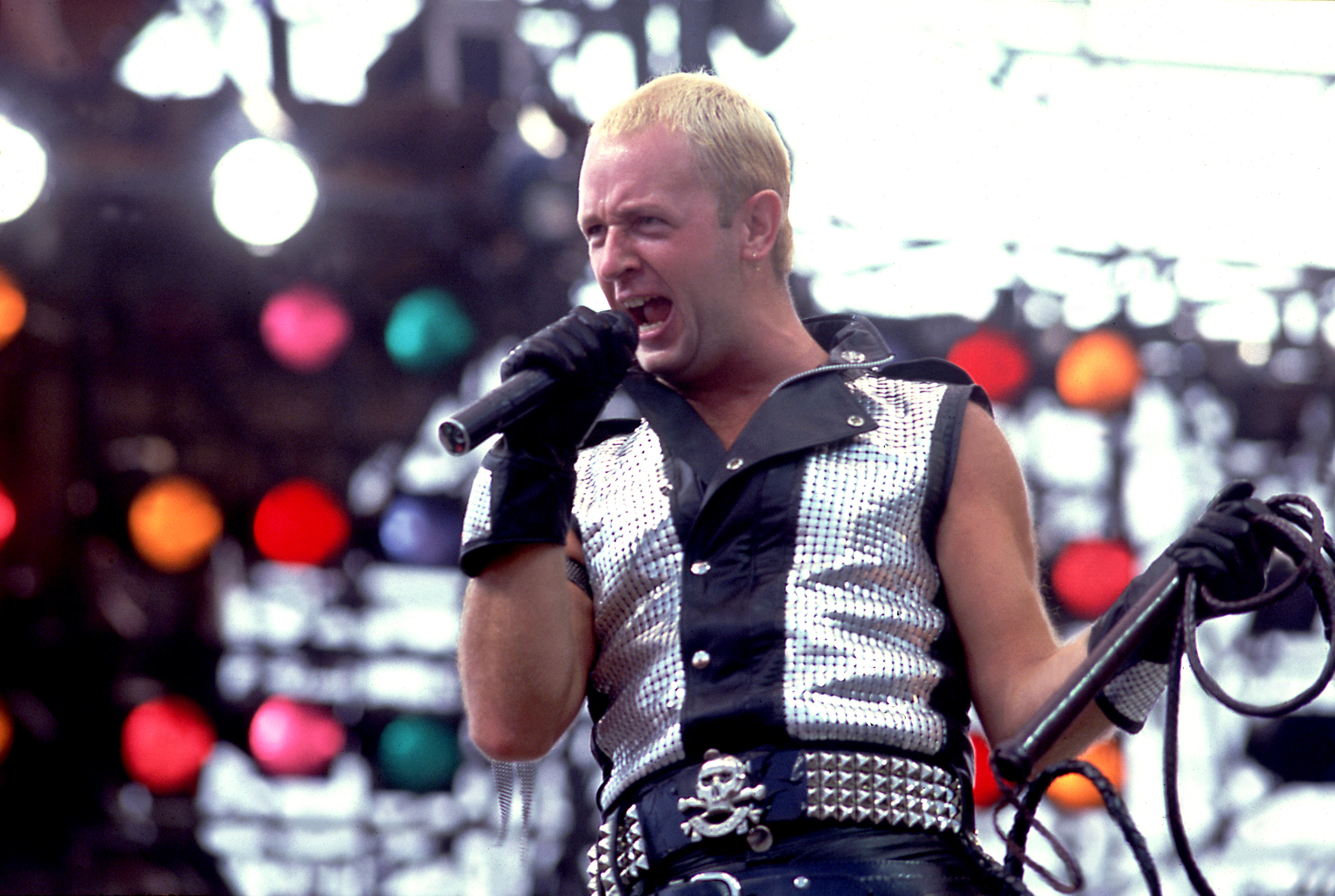
Screaming For Vengeance arrived in 1982 featuring an armour-plated bird on its sleeve which the group dubbed The Hellion. It accelerated Priest’s ascent, the hit You’ve Got Another Thing Comin’ increasing their audience by an estimated 30 per cent.
The band’s biggest album, it sold more than two million copies. They toured exhaustively to promote it, appearing in front of 250,000 at the US Festival in California that same year with headliners Van Halen.
“What helped to keep our feet on the ground was that we still weren’t quite where we wanted to be,” reckons Downing now. “We wanted to be the biggest metal band on the planet. But it was a great life, and there were a lot of groupies around, needless to say. I’m still a bachelor today. I certainly did a lot of things I wouldn’t tell my mother about.”
If Priest had their work cut out in matching Screaming…, it didn’t show and 1984’s Defenders Of The Faith satiated the American heartland. Throughout this time the band’s absence from Britain was blamed on a reluctance to put on a second-rate performance minus their American stage-show. The truth was their finances simply wouldn’t allow it.
“I hate talking about money,” Downing told Soundcheck magazine when Defenders… was released. “But it got to the point where even the American tour for Screaming… was really doubtful. For 10 years we’ve had to conceal the fact that we’re skint from all of the journalists.
“Up until that last American tour we were taking on big loans, but now things are starting to look up for us. People should be happy for us because we are taking British heavy metal to the rest of the world.”
During the same interview, KK acknowledged that Priest’s absence had affected their popularity, with Iron Maiden and Motörhead now overtaking them in the affections of British rock fans.
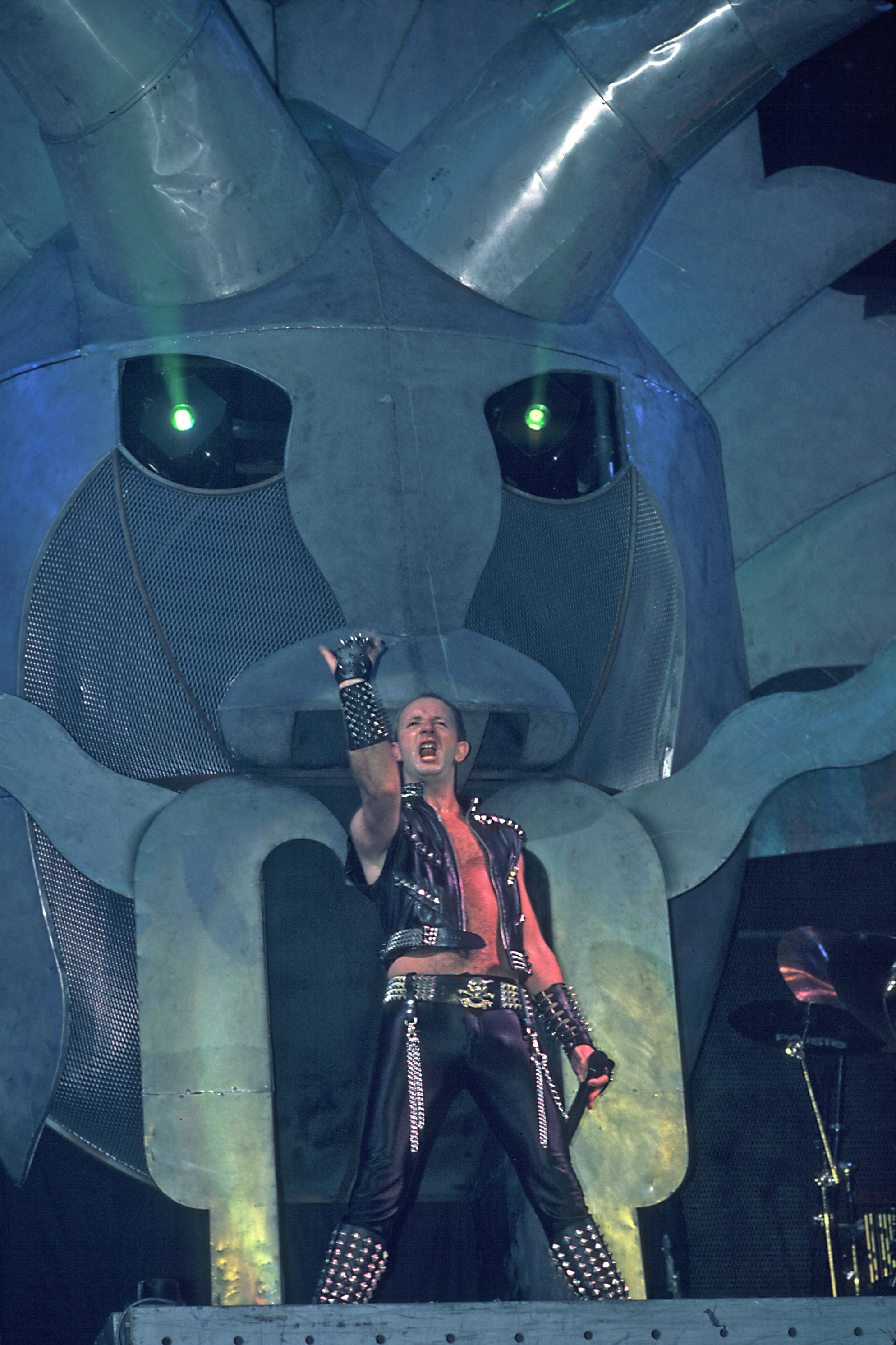
“It’s disappointing when you tour one year with Iron Maiden in support and they come out and wear all your clothes – I have to look at some pictures twice to see if Dave Murray is really me! – but you never hear one word in the press about Iron Maiden being Judas Priest lookalikes, ripping them off left, right and centre,” KK thundered.
His attitude to Steve Harris and company has subsequently mellowed, and more than 15 years later he now says: “They’ve found themselves and their niche, and they do what they do well. We’re two totally different bands now, but the common denominator’s that they, like us, have been flying the flag for this kind of British music all over the world.”
The controversial Turbo album, in 1986, didn’t help Priest’s cause. Though it’s taken on a belated importance to some fans, its use of guitar synths was critically panned when it first appeared. With Bon Jovi, Metallica and ZZ Top all ruling the American waves, Priest concede with hindsight that they may have been distracted by the prospect of trying to emulate that success.
Def Leppard, Mötley Crüe, Poison, Scorpions and Cinderella were all doing well in the mid-80s, and it made us curious,” admits Halford. Downing goes a stage further, commenting: “We wanted [Turbo] to be Judas Priest’s Pyromania. We’d seen the album that Quiet Riot did [Metal Health] selling eight million copies and it seemed like the time for Judas Priest to have our own monster, monster album.”
Ram It Down, which followed in ’88 (and was preceded by Priest… Live!) was so low on inspiration it actually contained a cover of Chuck Berry’s Johnny B. Goode.
“I wouldn’t exactly describe it as an era of confusion, but we were uncertain about the future,” Halford says now. So much so, Halford was starting to think beyond Judas Priest. “I can remember talking to the guys and [manager] Bill Curbishley and saying I was unhappy. My departure from the band wasn’t spontaneous, it’d been brewing since about 1986.”
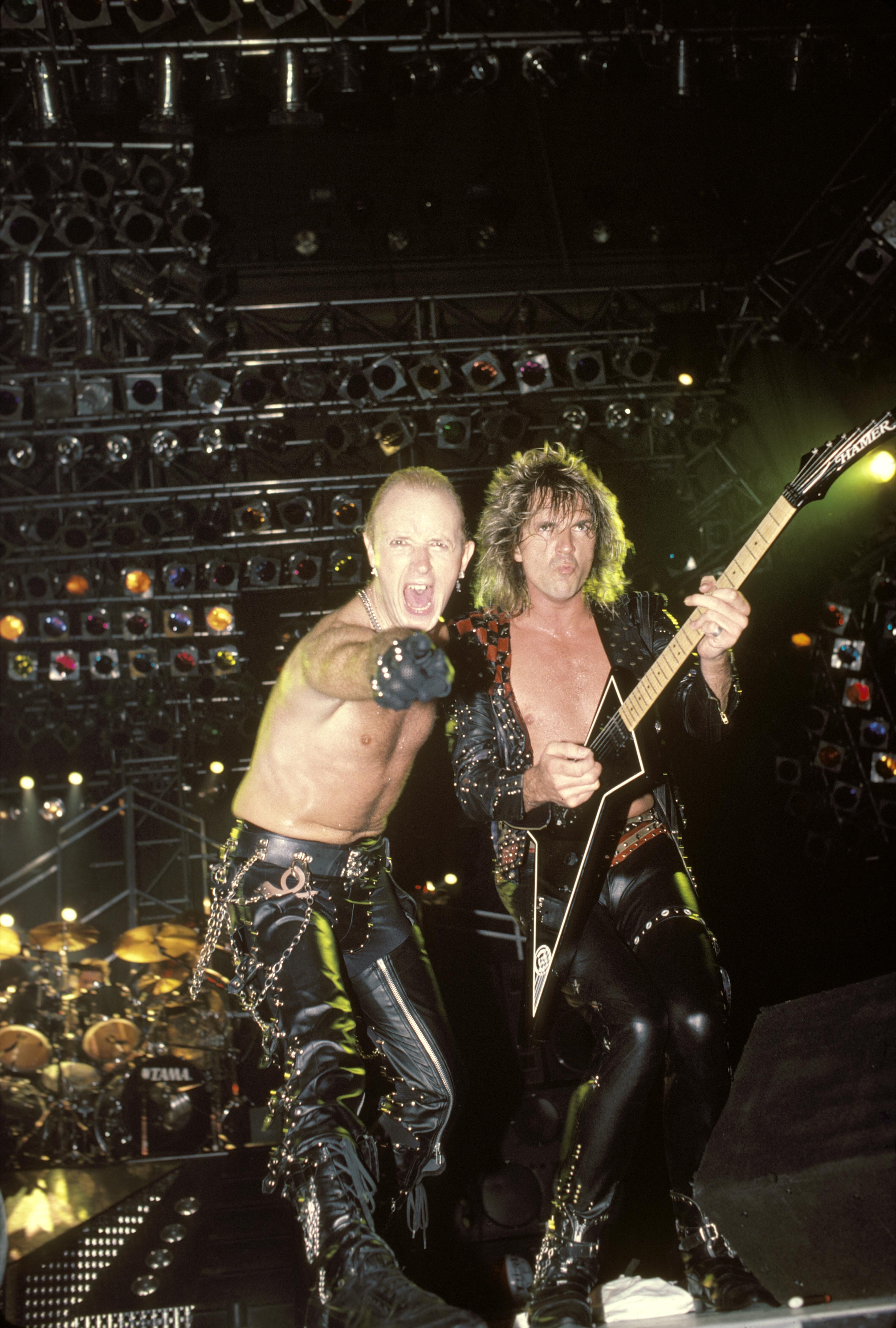
To add to the growing malaise, Priest found themselves summoned to a courtroom in Reno, Nevada to contest accusations that backwards-masked messages on Better By You Better Than Me (from Stained Class) had incited two local teenagers to enact a suicide pact, after listening to the song – actually a cover of an old Spooky Tooth tune – for six hours straight before attempting to blow their brains out.
One of them, Ray Belknap, was successful in his attempt, but the other, James Vance, was left horribly mutilated. He died three years later. In the first of many cases that would follow, the boys’ parents sued Priest and their label for $3 million. Although the band, especially Halford, made the claims seem laughable, they had to endure weeks of heavy cross-examination before the charges were finally, dropped.
“The prosecution would say, HOW many more people has this album killed?” recollects Tipton, still scratching his head with irritation and puzzlement. “It was all barefaced lies. Why would we encourage our record buying public to kill themselves?”
“Even now, I still can’t come to terms with the fact that we ended up in that situation, just for making music,” KK splutters. “The one good thing that came of it was that it called the dogs off for other bands. Especially when you consider how positively we won the case. It will be a cold day in hell before something quite as ridiculous as that happens again.”
“A song on the [next Priest] album called Bloodsuckers has a subliminal message,” confides Glenn. “But there are only two people who know what it is. And I’m not telling.”
In the light of the Reno debacle, Priest returned to the fray angrier than ever. Although it remains a milestone in Priest’s catalogue, Painkiller, which followed in 1990, was, ironically, considered too heavy for some fans. KK remembers that of the five tracks included in their set at the start of the tour, only two remained at its conclusion. The tour finished in Montreal in embarrassment, with Halford being knocked from his Harley and spending the last number, Hell Bent For Leather, out cold as the band played on.
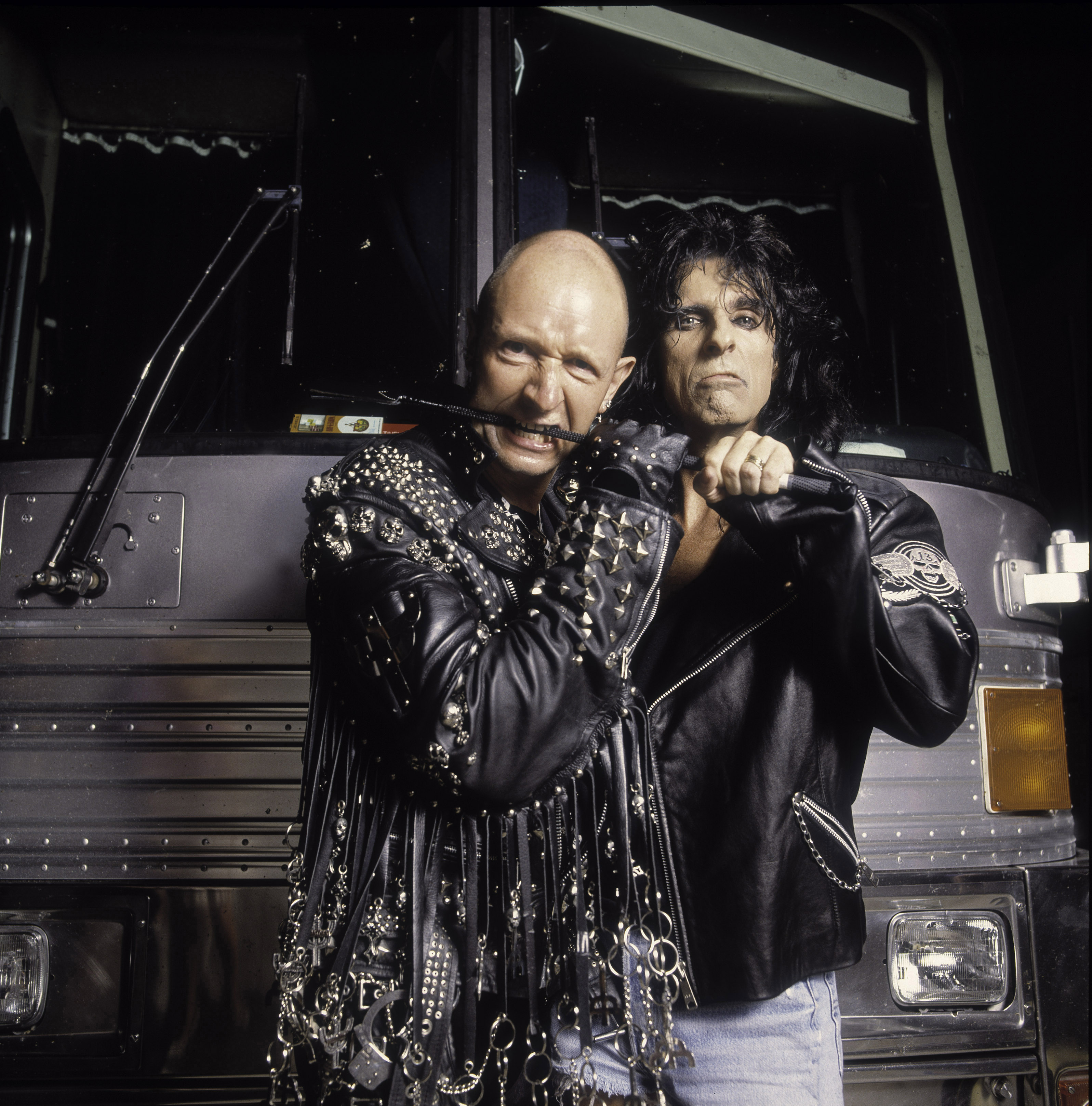
“There was so much dry ice about that I didn’t realise what was going on,” remembers Glenn. “All I knew was that there were no vocals. And then I realised I was standing on Rob’s chest! He was lucky he wasn’t decapitated.”
“I not only fell off the bike, I fell out of the band,” reveals Halford. “I broke my nose and never put it back, so whenever I scratch it’s my permanent memory. Yes, it was Spïnal Tap.”
When, in 1992, Halford announced the launch of a new band, Fight, it was originally intended as a side project. However, Sony Records (as CBS had now morphed into) insisting on releasing the first Fight album, War Of Words, worsened the situation. Determined to see the project through with another label, Rob decided to call their bluff and, on July 4, 1992, offered his resignation from Priest.
Says Halford now: “My initial hope had been that I could stay with the band because our contract was restrictive and unfair. I was about to go into litigation with Sony when they offered to put the album out through Epic, but by then the damage had been already been done.”
Although Tipton claims he’d seen problems brewing (“We knew he was being got at by certain parties”), Downing purports to have been astonished by the news.
“Rob was slightly more elusive on the last tour, and being a gay man, he wouldn’t go out and do the same activities as the rest of us. He’d had a lot of years in the closet but towards the end of that tour he started to do a few things that were slightly femme. There was a bit of strange dancing here and there onstage.”
When asked how long KK had been aware of Rob’s homosexuality – an open secret in the music business that came as a surprise to many when Rob officially ‘came out’ during an interview with MTV in 1995 - the guitarist chortles, “Since about 1971.”
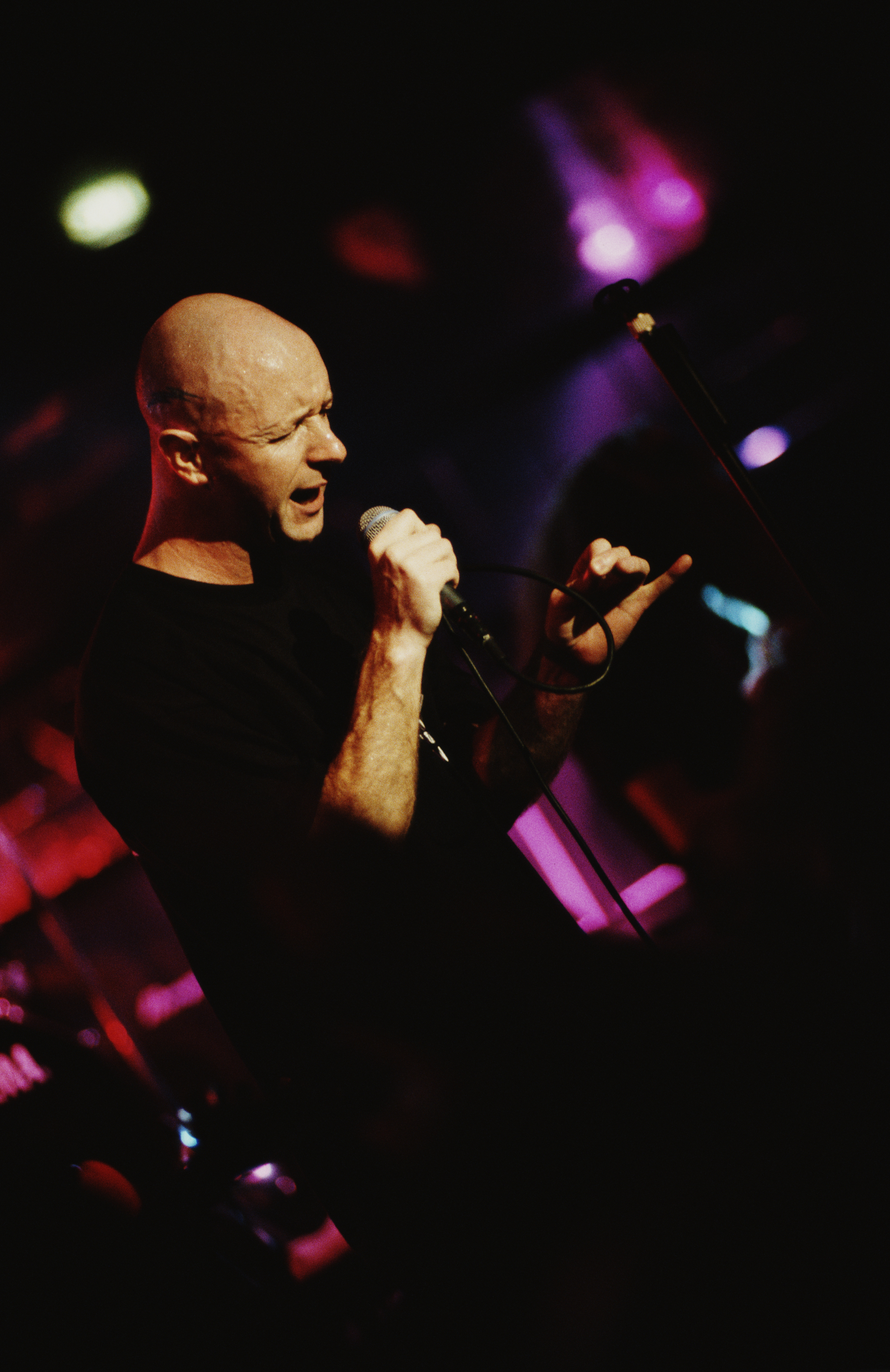
Halford’s sexual proclivities are nobody’s business but his own, of course, but they’re relevant here because Downing suspects that the singer’s being gay may have hastened his departure from Priest. “Maybe he was frustrated because he wanted to come out, but to this day I really don’t know why he left the band.”
Halford is quick to deny that his sexuality had anything to do with his leaving. “It was never that important an issue to have that affect,” he shrugs. “Metal represents a super-macho thing, but I’ve been a gay man all my life and I’ve never let that part of me take the leading role in my music.”
Was Halford ever tempted to come out during his time with Priest?
“Many, many times, but I always kept my mouth shut. I was often asked about the way I looked or the way I acted, and I always turned it back on the interviewer. ‘What do you mean?’, I’d say. ‘I don’t go onstage in a fucking dress!’ But I never directly lied about it.”
That Rob chose to quit Priest by fax, taking drummer Scott Travis with him, only helped rub salt in the wound. Media warfare erupted. Meanwhile, to the obvious glee of all outside Fight, Halford’s new band were forced to downscale their first show at London’s Astoria to the LA2. Tipton and Downing, who had been informed they would not be welcome at any of Fight’s UK shows, responded to the “deranged mumblings” of their ex-singer by crowing: “This latest outburst has obviously stemmed from his disastrous tour and album.”
Halford in turn issued a press release in which he described his ex-partners as “tyrannical”, and accused them of “carefully keeping important facts” about his exit out of their own statements.
Among the issues cited by Halford now for leaving Priest was a long-standing rivalry between Tipton and Downing. “Ken and I can be viciously hateful to each other, but we’ve so much in common,” Tipton told me in 1993. “We fight like cat and dog, but it’s probably important in making the band tick.”
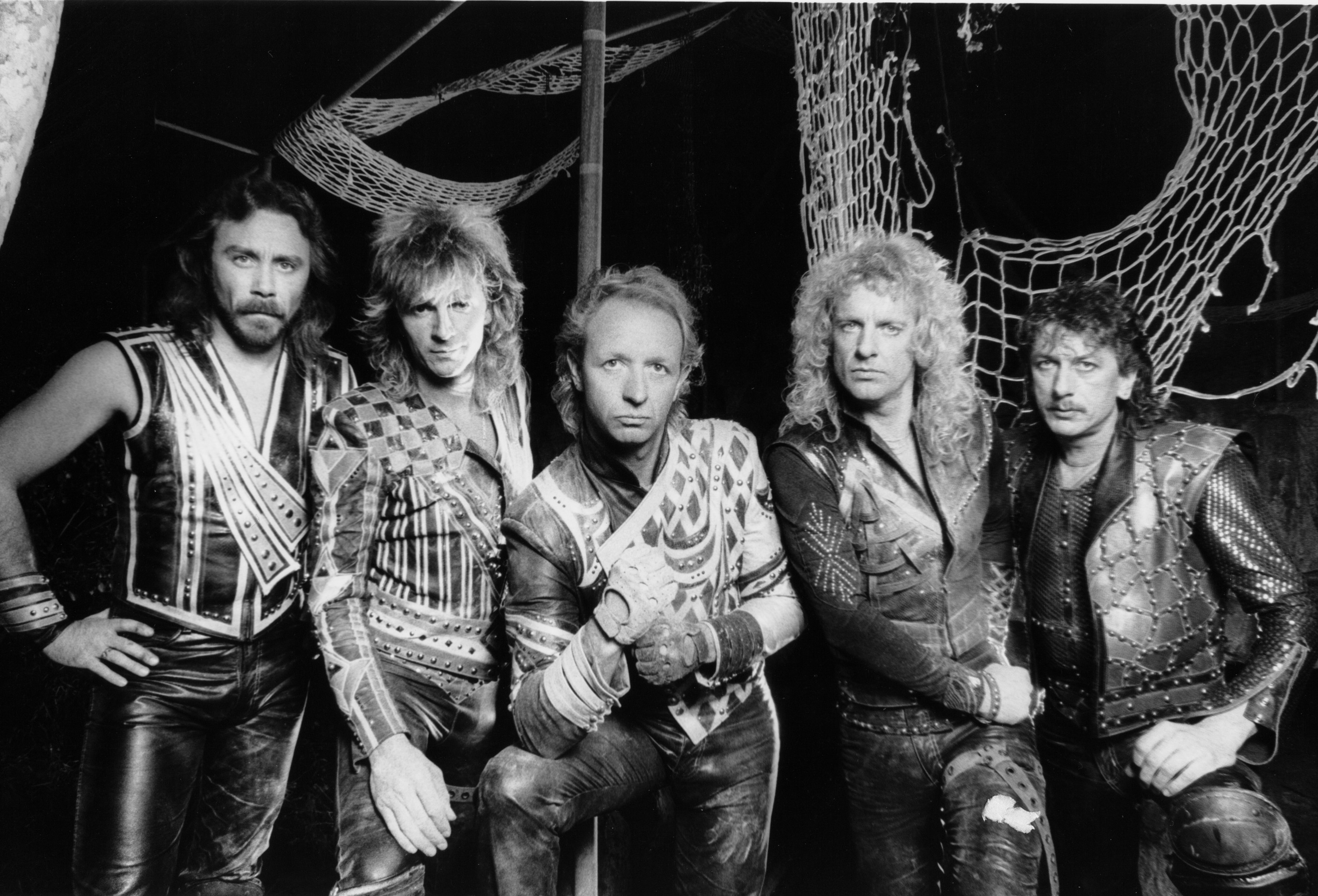
The remaining members vowed to fight on, although it took them until May 1996 to find a plausible replacement. An unknown American, Tim Owens, was discovered by drummer Scott Travis (now returned to the fold) in the Priest tribute band, British Steel. Nicknamed ‘Ripper’ after the Priest song of the same name, Owens was able to re-create Halford’s ear-splitting shrieks with ease. “Tim’s the only person on the planet who can sing those songs better than Rob,” boasts Tipton. “Our finding him was really nothing short of a miracle.”
However, KK admits that despite Priest once again finding form with 1997’s Jugulator and 2001’s follow-up, Demolition, there will be some who never really accepted Judas Priest without Halford.
“There are people who’ve fastidiously gone to gigs and bought albums, and then Priest go and move the goal posts,” says the guitarist. “It was the same for me when Jimi Hendrix disbanded the Experience. All I can say to those people is that it was completely out of our control.
Demolition, the next album, although slightly more melodic in places, retained the Machine Head-meets- Slayer intensity of its predecessor.
“We can never bloody win on that score,” retorts Tipton. “Our problem’s that we’ve made 16 albums. It would be wonderful if people reviewed or judged an album on merit, rather than comparing it to their own favourite…”
Demolition would be the last album with Tim Owens before Halford returned to the Judas Priest fold for 2005’s Angel Of Retribution.
“I never wanted to leave Priest,” says Rob, his frustration evident. “We should have taken two years off after Painkiller. In that dressing room on the last night of the tour in Toronto, there was a war going on. It wasn’t just me, there were a lot of things that people don’t need to know about. I’m not gonna go into them here, but it was no different to what happened to The Beatles, the Eagles, Maiden or Mötley Crüe. Things go on behind the scenes that we all have to take responsibility for.”
This article originally appeared in Classic Rock #110.
For more on Judas Priest and the subliminal message trial they underwent, then click on the link below.
